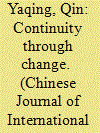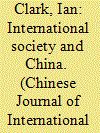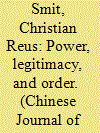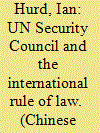|
|
|
Sort Order |
|
|
|
Items / Page
|
|
|
|
|
|
|
| Srl | Item |
| 1 |
ID:
133955


|
|
|
|
|
| Publication |
2014.
|
| Summary/Abstract |
The 'assertive China discourse' has become a widespread narrative in the United States and certain other countries, and there is a parallel narrative in China. It argues that China has abandoned the taoguangyanghui (Keeping a low profile) strategy and adopted that of fengfayouwei (Striving for achievements), especially since 2009. This article, taking background knowledge as the most important factor of an agent's thinking and doing, argues that the Zhongyong dialectic constitutes a core component of background knowledge on the Chinese. It holds that a strident turn from one strategy to the other is inadvisable, and indeed continuity through change is a realistic description of China's present international strategy. It implies the existence of both continuity and change, although the former is its main theme with regards to strategic goals, designs, and policies as a whole. Changes, however, do occur, mainly through issues perceived as relevant to core national interests. The textual analysis in this article provides support for this argument, but offers little to substantiate the 'assertive China discourse'. Also worthy of note is that it is easy to use such changes to infer a revolutionary turn in China's international strategy, as the 'assertive China discourse' has done, as it fits perfectly into the embedded Hegelian dichotomous structure under the background of a realist tragedy of major power politics. Such an interpretation, however, is both biased and dangerous, because it attempts to turn a constructed narrative into a conventional wisdom. This could potentially culminate in a self-fulfilling prophet of the zero-sum struggle in a Hobbesian jungle, particularly between China and the United States.
|
|
|
|
|
|
|
|
|
|
|
|
|
|
|
|
| 2 |
ID:
133956


|
|
|
|
|
| Publication |
2014.
|
| Summary/Abstract |
The core suggestion of this article is that we make best sense of the concepts of power, legitimacy, and responsibility within a framework of international society. This framework is illustrated by, and applied to, the specific case of China's rise. In the light of its historical background, a rising China faces a major paradox. Seemingly, the prerequisite for it to exercise greater influence on the norms of international society is yet further assimilation into them: in order to become a respected norm maker, China must first be seen to be fully integrated as an appropriate norm taker. To be in a position to influence the norms of international society, China must seemingly firstly resolve any lingering ambiguities about its membership. In short, should the debates about China's status be understood as an expression of the power of norms (where China is assessed relative to some universal standard of responsibility), or are they better viewed as the deployment of the norms of power in such a way as to impact its social distribution to China's disadvantage (by imposing the self-interested standards of the liberal states)?
|
|
|
|
|
|
|
|
|
|
|
|
|
|
|
|
| 3 |
ID:
133957


|
|
|
|
|
| Publication |
2014.
|
| Summary/Abstract |
Legitimacy is not something distinct from power; it is one of the vital sources of power. And if power shapes the nature and development of international orders, then the politics of legitimacy features prominently in the construction, maintenance, and dissolution of such orders. This article begins by exploring the concepts of power and legitimacy, their theoretical interconnection, and the impact that crises of legitimacy have on the maintenance of political power. It then takes an empirical turn, examining, however briefly, two sites in which the politics of legitimacy had a profound effect on the development of the modern international order. The first concerns the globalization of the system of sovereign states, a four-century long process of imperial extension, crisis, and fragmentation into successor states, a process in which struggles over individual rights played a key role. The second concerns the definition and distribution of special responsibilities for managing functional challenges among states. In orders characterized by formal sovereign equality, on the one hand, and imbalances of material capabilities, on the other, a mechanism needs to be found for containing and harnessing power to meet the problems faced by the international community. Historically, this has been achieved through the allocation of special responsibilities to particular states, usually great powers. But if regimes of special responsibilities create patterns of more or less formal hierarchy among states, they are also sites of intense battles over legitimacy.
|
|
|
|
|
|
|
|
|
|
|
|
|
|
|
|
| 4 |
ID:
133958


|
|
|
|
|
| Publication |
2014.
|
| Summary/Abstract |
This article considers the relationship between international law and the UN Security Council. The practical power of the Council is constituted at the intersection of its legal framing, its political legitimacy, and the interests of powerful states. This sometimes means the Council has less power than is assigned to it by the UN Charter, but it often means that it has more. It is clear that the Council sits within the international legal system, the legal limits on its action are interpreted in light of prior Council practice, and thus the meaning of 'compliance' and 'violation' of the Charter changes over time. Some transgressions of the Charter are understood as informal amendments to it; others are seen as threats to international peace and security that impel enforcement action. This ambiguity in the law and practice of the United Nations is inherent in the idea of the 'international rule of law'. The Council straddles the unstable boundary between international law and politics, both undermining and reinforcing the distinction between them.
|
|
|
|
|
|
|
|
|
|
|
|
|
|
|
|
|
|
|
|
|